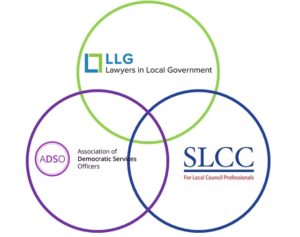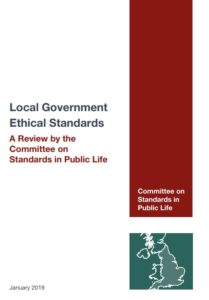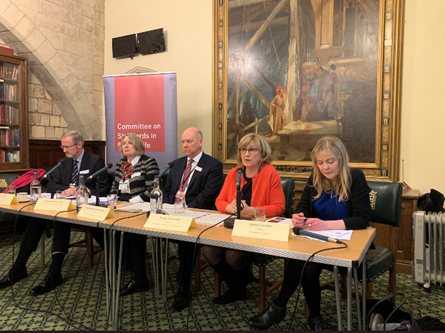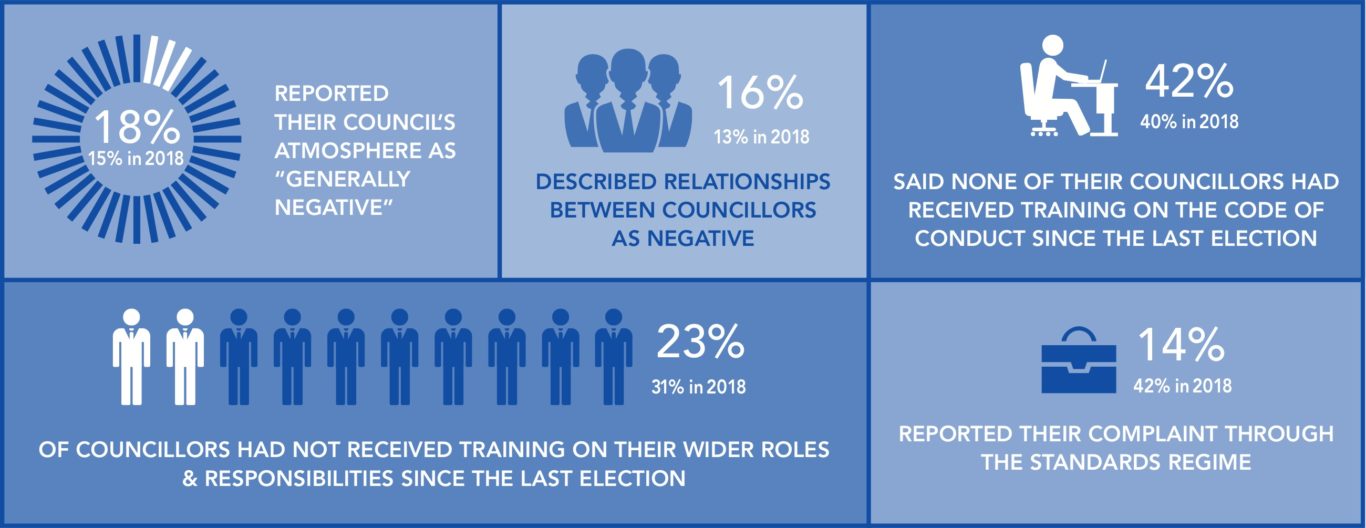Improving Professional Standards
As the professional body for town, parish and community clerks in England and Wales, SLCC is the voice of the profession. We pride ourselves on our collaborative work across the sector to ensure the issues of importance to you, our members, are represented.
In 2017, SLCC commissioned Hoey Ainscough Associates Ltd to conduct an extensive piece of research to support a report on the state of standards and behaviour in the sector. The report included the first evidence-based data on the subject.
At the time of the report, the profession had an average turnover rate of between 25% – 30%. This is disproportionately high (the average UK employee turnover rate is 12% – 15%). Further, the report indicated that this was not so much a reflection of the abilities of the officer involved, but how they are treated.
Since the report was commissioned, we have worked hard on improving professional standards, working with sector partners to produce a Code of Conduct and a Local Council Governance Toolkit to support clerks and monitoring officers who are experiencing problems with standards and behaviour.
We plan to build on our professional presence by lobbying the government via consultations, meetings and partnering with other colleagues including the National Association of Local Councils (NALC), Lawyers in Local Government (LLG), the Association Of Democratic Services Officers (ADSO), and the Local Government Association (LGA).
While it is fortunate that this issue impacts directly on a minority of members, its impact and implications – the shadow it casts – in terms of the profession and the sector goes much further. The fundamental issues of employment security, appropriate management, and equitable and lawful treatment of clerks and officers have a significant impact on the delivery of SLCC’s mission of improving professional standards in the sector. We have created this resource to keep you abreast of our ongoing work and progress.
SLCC, National Association of Local Councils (NALC), county associations of local councils and One Voice Wales (OVW) have joined together to form the Civility & Respect Project Working Group committed to promoting civility and respect in public life, good governance, positive debate and supporting the well-being of councillors, professional officers and staff. Read more about the Group below.
Please scroll down to view a summary of the recent 2021 Standards and Behaviour Survey along with a timeline of actions and events.
Our Belief
We believe that temporary suspension and, in the most egregious of cases, permanent disqualification should be available as sanctions for breaches of the Code of Conduct.
We also believe that training should be mandatory for councillors – specifically in roles and responsibilities and employment management and legislation.
Timeline
April 2023
Hazel Broatch is appointed as the new Project Manager for the project.
March 2023
The sixth Civility and Respect Project newsletter is published. Click here to view the March 2023 update.
November 2022
The fifth Civility and Respect Project newsletter is published. Click here to view the November 2022 update.
Various new resources have been created and added to the website this month as follows:
Social Media Guide
Roles and Responsibilities Guidance
Model Councillor-Officer Protocol
The Civility and Respect Project team worked in partnership with Chris Moses, Managing Director of Personnel Advice and Solutions Ltd, to deliver a series of podcasts explaining councils responsibilities as employers. The first two were released in November:
August 2022
The fourth Civility and Respect Project newsletter is published. Click here to view the August 2022 update.
June 2022
The third Civility and Respect Project newsletter is published. Click here to view the June 2022 update.
February 2022
The second Civility and Respect Project newsletter is published. Click here to view the February 2022 update.
November 2021
The first Civility and Respect Project newsletter is published. Click here to view the November 2021 update.
October 2021
Michelle Moss, will commence her role as Project Manager on 4 October 2021. Michelle was previously deputy clerk for Horncastle Town Council and has also had a successful career in project management for the financial and transport sectors. Michelle will be focused on bringing forward the objectives of the group and will work closely with SLCC, NALC, OVW and the county associations in the joint approach to raising standards and behaviour throughout the sector.
Members found out more in the Update from the Civility Group at National Conference 2021.
August 2021
Interviews for the role of Project Manager have taken place and the successful applicant has been notified. More details to follow.
July 2021
The Civility & Respect Working Group publish the Project Manager vacancy.
The position has since been filled.
June 2021
The Civility & Respect Project Working Group finalise plans for the appointment of a Project Officer to drive forward the important package of work named the ‘Civility and Respect Project’. Click here to read the full update and the Group mission statement.
May 2021
Rob Smith, SLCC Chief Executive, Steve Trice, SLCC Chairman, Linda Larter MBE FSLCC, SLCC President, and Lee Dunkley FSLCC, SLCC Director (South West), attend second meeting of the Civility in the Sector Working Group.
SLCC Chairman, Steve Trice said, ‘The Working Group meetings have been productive and we are working hard to move this important issue forward. We are optimistic that this joint approach with dedicated resource will further strengthen the Code of Conduct and toolkit to support clerks and monitoring officers who are experiencing problems with standards and behaviour.’
April 2021
March 2021
SLCC receive a response following its letter to Robert Jenrick MP, Secretary of State for Housing, Communities and Local Government on 19 February 2021 in support of NALC’s request for changes to the current standards regime and to press for a response to the Committee on Standards in Public Life (CSPL) review of local government ethical standards. Read the full letter here.
The Government has confirmed it intends to publish ‘its formal response in due course’ and ‘recognises it has a key part to play in ensuring the standards framework is clear, effective and serves to enhance the reputation of local government, particularly regarding the behavioural difficulties faced by local councils.’ Read the Government response here.
February 2021
LGA has commissioned Hoey Ainscough Associates Ltd to produce good practice guidance to accompany the new code of conduct. SLCC attended a Code of Conduct meeting on 16th February along with other sector partners to discuss the guidance and will provide feedback as it is produced.
Rob Smith wrote to Robert Jenrick MP, Secretary of State for Housing, Communities and Local Government in support of NALC’s request for changes to the current standards regime and to press for a response to the Committee on Standards in Public Life (CSPL) review of local government ethical standards. Click here to view the letter.
December 2020
SLCC commission a further survey (to our survey in 2017) from Hoey Ainscough Associates which provided comparative data. The survey closed Friday 15th January 2021. The data is now being analysed and Paul Hoey of Hoey Ainscough Associates will present the findings at our virtual Practitioners’ Conference on 23rd, 24th and 25th February 2021.
October 2020
Our Board and Forum meetings w/c 12th October included in-depth discussions on standards and behaviours – as they often do – and we generated some promising ideas. On each of those bodies we are not short of practicing professionals with a great deal of experience and knowledge.
We are currently developing a plan of deliverable actions which will aim to improve things for our members and move things forward.
September 2020
SLCC attended a stakeholder group meeting as a final stage of consultation on CoC.
August 2020
SLCC made formal submission to LGA CoC consultation.
LGA offered a bespoke local council clerks consultation webinar.
April 2020
SLCC conducts the full membership survey to inform its formal submission to LGA on the draft model Code of Conduct.
January 2020
SLCC attended consultation workshops as part of the LGA’s work on a CSPL recommendation to develop a model Code of Conduct for national use across all tiers of local government
November 2019
SLCC attended ‘Civility in Public Life’ conference
February 2019
SLCC partnered with LLG and ADSO to form a taskforce. Initial objectives were to influence the development of the model Code of Conduct and to deliver a ‘toolkit’ to support clerks and monitoring officers

January 2019
CSPL report published

December 2018
SLCC meet with Rishi Sunak (Parliamentary Under-Secretary of State for Local Government) to seek his support on delivery of the CSPL report recommendations

April - October 2018
SLCC attended CSPL consultation roundtables and provided supporting evidence used in CSPL Report on Local Government Ethical Standards
March 2018
The Hoey Ainscough report was published

October 2017
In 2017, the Board setup a Standards & Behaviour Working Group and approved financial resource to fund the commissioning of research and a formal report into standards issues in the local council sector.
SLCC commissioned Hoey Ainscough Associates Ltd to conduct an extensive piece of research to support a report on the state of standards and behaviour in the sector.
Surveys
A summary of the 2018 & 2021 survey results
2021 Survey on Standards & Behaviour
Workplace Bullying remains high on the list when it comes to members seeking advice from SLCC and our sector partners. The bottom line is that it can cause ill-health, it affects morale and is the cause of untold misery to people in this sector. Your concerns and representations at the 2020 Virtual National Conference, National Forum meeting and at Board level are at the forefront of the work we are doing on your behalf to bring about the changes which you have so rightly demanded to improve standards and professionalism across the local council sector.
We recently commissioned a survey from Hoey Ainscough Associates, further to the survey in 2017, which closed 15th January 2021 and provided comparative data. The high number of respondents reflects the largely negative impact that code of conduct issues have on the working lives of our members and the importance of the SLCC lobbying on your behalf for change.
Click here to view the full report conducted by Hoey Ainscough Associates, the recommendations are set out on pages 17 – 20.
At the 2021 Practitioners’ Conference, Paul Hoey, along with colleagues from SLCC, Lawyers in Local Government (LLG) and the Association of Democratic Services (ADSO) launched the new Local Governance Toolkit, providing a vital resource available not only to parish, town and community council officers in England, but, for the first time, to local council Democratic Services Officers. The Toolkit, which is available to SLCC members, provides information on a range of issues including governance, roles and responsibilities, public engagement, managing information and elections, along with template policies, protocols and forms.
The Committee on Standards in Public Life (CSPL)
CSPL was established in 1994 and is an advisory non-departmental public body of the UK Government. Its remit is to advise the Prime Minister on ethical standards of public life and the promotion of the Code of Conduct called the Seven Principles of Public Life, better known as the ‘Nolan Principles’.
In January 2019, the CSPL published their review of Local Government Ethical Standards. It included 25 recommendations which affected all tiers of local government.
The review reflected the significant role SLCC had taken and the significance of the research we had commissioned in the discussions and formal consultations which formulated the report. It covered a wide range of ethical issues across all tiers of local government.

It’s findings in relation to local councils included:
- Parish councils are highly dependent on the skills, experience and support of clerks – it found evidence of substantial difficulties where clerks are inexperienced, untrained, feel isolated and/or there is poor member behaviour
- 15% of parish councils experience serious behaviour issues, 5% are effectively dysfunctional as a result of them
- Parish councils should report complaints, not the clerk
- Some Monitoring Officers decline or lack resources to provide advice or accept parish complaints
- Variation in parish codes is a burden on the principal authority and confusing for dual hatted members
- Parish councils can ignore sanctions recommended by principal authority hearing
- Parish councils can take lawful protective steps short of sanctions
Recommendations
On a Code of Conduct
Recommendation 1: The Local Government Association should create an updated model code of conduct, in consultation with representative bodies of councillors and officers of all tiers of local government.
Recommendation 20: Section 27(3) of the Localism Act 2011 should be amended to state that parish councils must adopt the code of conduct of their principal authority, with the necessary amendments, or the new model code.
On Monitoring Officers
Best practice 12: Monitoring Officers’ roles should include providing advice, support and management of
investigations and adjudications on alleged breaches to parish councils within the remit of the principal authority. They should be provided with adequate training, corporate support and resources to undertake this work.
On Sanctions
Recommendation 16: Local authorities should be given the power to suspend councillors, without allowances, for up to six months.
Recommendation 17: The government should clarify if councils may lawfully bar councillors from council premises or withdraw facilities as sanctions. These powers should be put beyond doubt in legislation if necessary.
Recommendation 21: Section 28(11) of the Localism Act 2011 should be amended to state that any sanction imposed on a parish councillor following the finding of a breach is to be determined by the relevant principal authority.
On Clerks’ Competence
Recommendation 19: Parish council clerks should hold an appropriate qualification, such as those provided by the Society of Local Council Clerks.
Get in touch
If you feel that you have an idea or suggestion to help move this forward, please get in touch by email or phone or by whatever means you choose. Every member has a local Branch and National Forum Representative through whom they can channel feedback to the National Forum and onto the Board. But, if you’d prefer to speak with our Chief Executive, Rob Smith, directly, please email [email protected]

